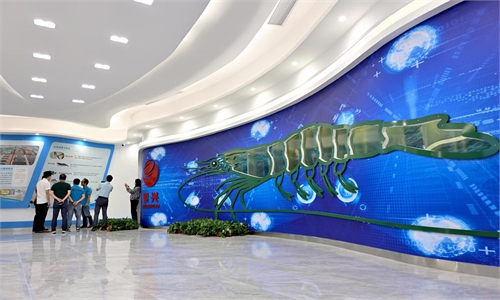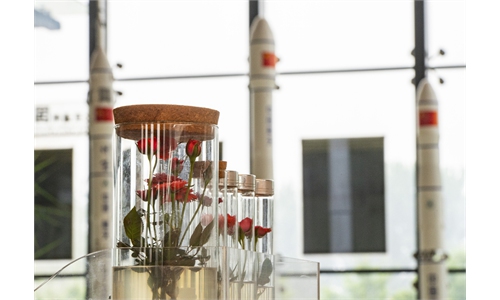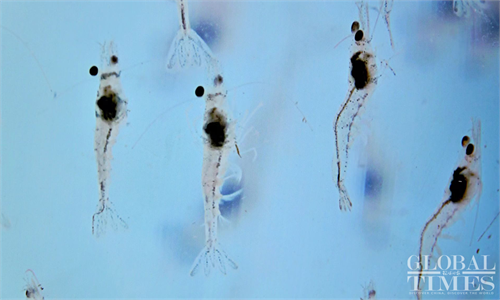Chinese homegrown poultry variety breaks decades-long monopoly by developed countries
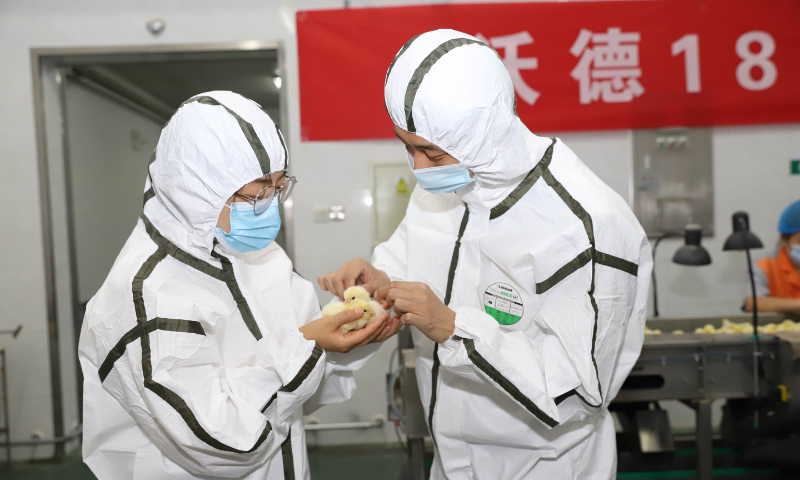
Customs officials check chicks ready to be export at the Pinggu customs in Beijing on June 14, 2023. Photo: Courtesy of Yukou Poultry Co Ltd
In the early morning on June 16, 2023, a Tanzania Airways flight TC403 touched down at Julius Nyerere International Airport after an over 11-hour journey. Passengers onboard might be unaware that in the underbelly of the plane stood a consignment of special "guests" - 16,500 chicks from Beijing.The shipment, consisted of parent stock of 15,500 "Jinghong 1" high-yielding layers and 1,000 "Wode 188" white feather broilers, all domestically bred by Beijing Huadu Yukou Poultry Industry Co. Ltd. - marks the first time China has exported its own breed of poultry.
The export of the home-bred "Wode 188" variety in China also represents a significant milestone for the international market, as it's the first time for a Chinese company has "encroached on the monopoly" long held by European and US producers.
"Due to quarantine regulations and other factors, live poultry from China had never been exported before," Fan Shijie, executive director of the Yukou Poultry R&D, who was in charge of the first-ever "export mission", told the Global Times in a recent interview.
Revitalizing seeds
According to Fan, the successful export in June was a result of combination factors including the nation's call for revitalizing the domestic seeds industry marking the 10th anniversary of the China-proposed Belt and Road Initiative, as well as the deepening friendship between China and Tanzania.
All these favorable conditions allowed China's laying hens and broiler breeds to finally go beyond Chinese borders.
Recalling the nearly 40-hour journey "escorting" the precious shipment, Fan vividly remembers each time point. The journey began on June 14 at 11:00 pm when the first batch of chicks was transported from the hatching facility in the Pinggu district in suburban Beijing.
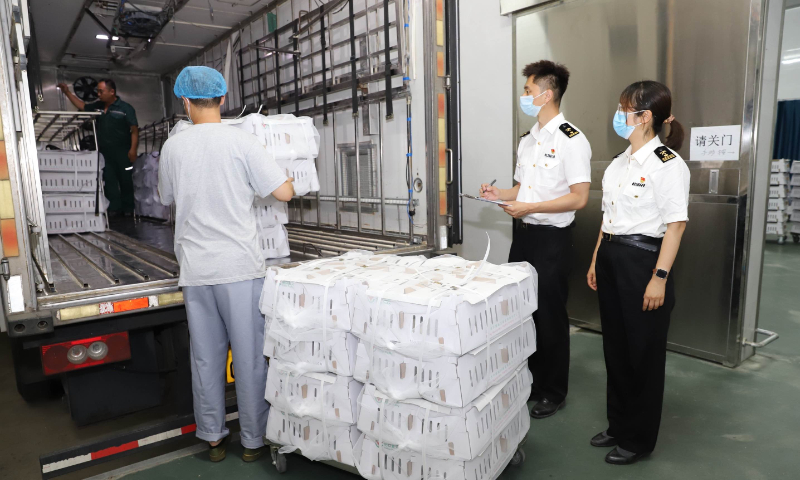
Customs officials check chicks ready to be export at the Pinggu customs in Beijing on June 14, 2023. Photo: Courtesy of Yukou Poultry Co Ltd
On June 15 at 3:00 am, the chicks were delivered to Beijing Daxing International Airport before departing for South China's Guangzhou city at 8:15 am. Then, on June 16 at 12:15 am, they flew from Guangzhou to Tanzania, landing at 6:49 am local time. Thanks to the extraordinarily careful treatment at each stage, the trip was successful.Upon arrival in Tanzania, the chicks achieved an impressive 98.92 percent survival rate. Furthermore, even after reaching a local chicken farm, the overall survival rate has remained remarkably high, remaining at above 97 percent, and the chicks have been thriving in excellent health, Fan said.
Fan noted that the company took extra precautions by sending two technical staff members to Tanzania ahead of the crops' arrival. Their purpose was to assess the local conditions and provide assistance in ensuring optimal conditions for breeding and raising the chicks, to ensure "nothing goes wrong."
"This export has certainly created a ripple effect," Wu Guiqin, vice general manager of Yukou Poultry and director of Wode R&D, told the Global Times, adding that following the announcement, many companies from other countries and regions have reached out to Yukou Poultry, expressing their interest in importing Chinese broilers.
Path to self-reliance
The response from the international industry reflects recognition of China's decades-long efforts representing by Yukou Poultry and other firms alike, and a global anticipation of new players in a market that has been dominated by American and European companies.
Nevertheless, the path to self-reliance has been arduous.
In the 1940s, US scientists developed a modern white-feather broiler breed known for its large size, fast growth, and high meat and egg production. This breed became the top choice for commercial chicken farming in the world. In the 1980s, it was introduced to China and quickly gained popularity due to its significant advantages.
For a certain period of time, China, like most countries in the world, had a 100 percent dependence on foreign white feather broiler breeding stock, mostly from European and US companies.
Drawing a vivid analogy to risks of the reliance, Xiao Fan, a chief breeding expert from Fujian Sunner Group, told the Global Times that "it's like a 'faucet,' wherein foreign companies control the flow of imports, leaving Chinese enterprises with little bargaining power. This monopolistic control results in substantial cost pressures and risks for Chinese businesses.
Bird flu that appears from time to time is also a potential risk of relying on foreign breed introductions. Industry insiders interviewed by the Global Times mentioned that around 2015, the outbreak of bird flu in many countries had forced the import of Chinese white-feathered chickens to be suspended for more than six months then.
"As the poultry sector plays a vital role in providing protein to the public, We must focus on bolstering domestic production and reducing our dependence on imports for the sake of the industry's security," Xiao said.
Xiao, who led the breeding project in Sunner Groupn from 2011, said the work was secretly conducted in the deep mountains in Nanping city, East China's Fujian Province, to avoid from being "cut out of supply" from foreign companies.
"The initial stages of independent breeding were challenging, especially due to a lack of talent in commercial breeding," said Xiao.
But 10 years of hard work seem to have paid off. By the end of 2021, three varieties - Sunner Group's "Shengze 901," Yukou Poultry's "Wode 188," and Xinguang Nongmu's "Guangming 2" - all turned to be successful, and obtained official approval from the national committee for livestock and poultry genetic resources, putting an end to China's passive reliance on imported genetic resources for white-feather broilers.
According Wu, due to China's own domestic breeding, the price of chicks sold by foreign companies to China has been relatively low compared to other nations. For instance, in Japan, the price of buying breeders is two or three times more expensive than from Chinese companies.
As domestically bred white-feather broiler varieties are gradually promoted, China's broiler farming market is also undergoing a transformation.
Global leading breeds
The Ministry of Agriculture and Rural Affairs has launched a plan for national broiler genetic improvement (2021-2035), which aims to have domestically bred white-feather broiler varieties make up at least 60 percent of the market share by 2035, and at the same time, establishing internationally competitive seeds companies and variety brands.
Xiao expects that by 2025, "Shengze 901" variety, developed by the company will account for 40 percent of the domestic market that is expected to expand to the international market.
As a pioneer in exporting white feather broilers overseas, Yukou Poultry also plans to accelerate its expansion into countries along the Belt and Road Initiative, Fan said, mentioning that through their experience in Tanzania, Yukou Poultry has developed a feasible export model for other domestic companies in the country.
Yukou is currently discussing exports with enterprises from countries such as Ghana, Malaysia, the Philippines, Pakistan, Saudi Arabia and Laos.
China's white-feather broiler breeding is now leading in some segments internationally, prompting a growing number of foreign companies to learn from China's breeding practices, Wu said. "I believe that in the future, Chinese breeds will set the global standard."

